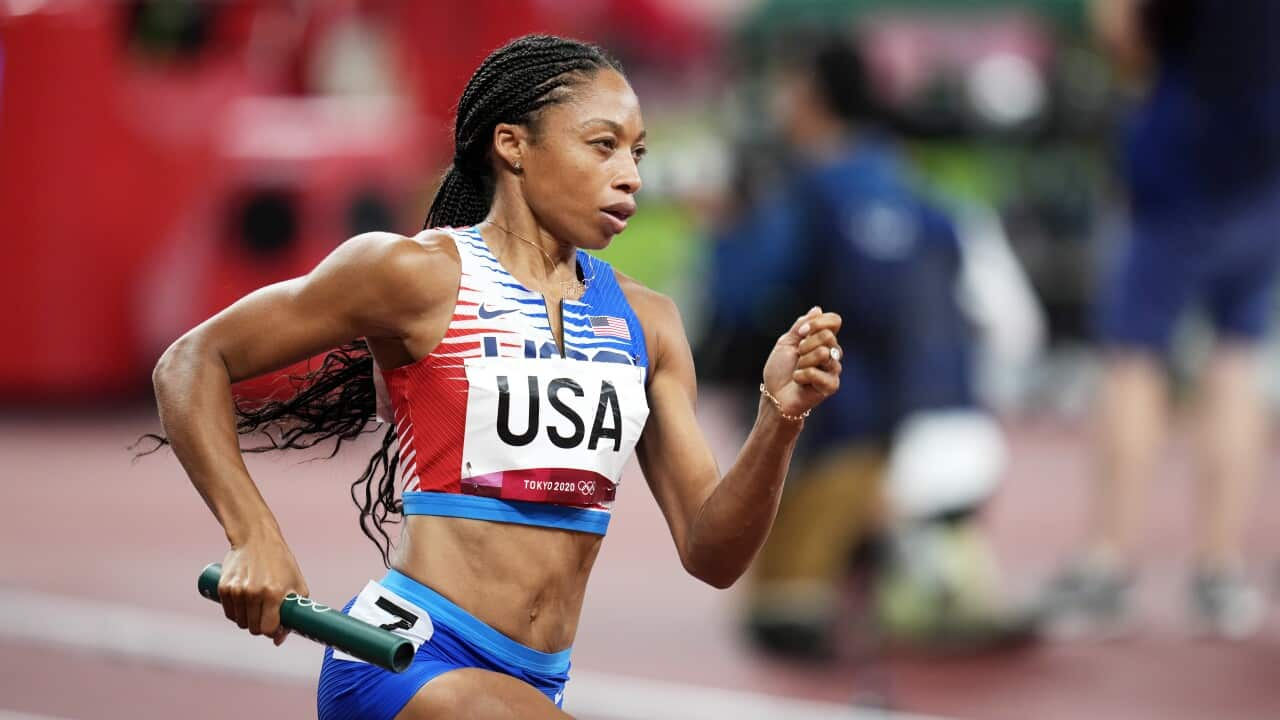Key Points
- Allyson Felix is launching the first-ever nursery in an Olympic Village at the Paris Olympics.
- The nursery is designed to offer athlete parents a space to spend time with their babies and small children.
- Felix is one of the most decorated track and field stars of all time and an advocate for mothers in sport.
Allyson Felix is one of the most decorated track and field athletes of all time, but now, she’s making history in a new way.
Felix, who retired after the 2022 season, is now part of the International Olympic Committee (IOC) and is launching the as part of the 2024 Games in Paris.
Speaking to CBS Mornings, the American athlete said she had been inspired by her experiences competing after becoming a mother in 2018.
“I just knew how difficult it was to compete at the top level after I had my daughter and some practical things were really hard,” she said.
“So when I [joined] the Athletes’ Commission of the IOC I really wanted to be that voice for athlete moms and just take away one less thing for them to worry about in the pressure of competition.”
The nursery is being created in partnership with the P&G brand Pampers and is designed to provide a “comfortable and convenient” environment for athlete parents to spend time with their babies and young children.
Felix said she hoped it would be part of a “shift in culture” and support mothers who are also elite athletes.
“I think it really tells women that you can choose motherhood and also be at the top of your game and not have to miss a beat,” she said.
“And it’s really a starting-out place, I would love to grow this even more.”
Who is Allyson Felix?
Allyson Felix is a retired sprinter who raced in the 100m, 200m, and 400m. She represented the United States at five Olympic Games between 2004 and 2020, winning 11 medals.
She has won 20 World Championships medals and is a 10-time US national champion.
She is the most decorated female athlete in Olympic track and field history, and the most decorated American track and field athlete.
Retired track and field athlete Allyson Felix is set to launch the first-ever nursery at the Olympic Village in Paris. Source: AAP / Ashley Landis/AP
She gave birth to her daughter in 2018 and resumed competing in 2019.
She retired at the end of the 2022 season, and in 2024 she gave birth to a son.
Under the Obama administration, she was a member of the President’s Council on Fitness, Sports and Nutrition. She regularly advocates for women and mothers in sports.
Earlier this month, she received a $US20 million ($29.5 million) grant from Melinda Gates’ investment initiative to further her advocacy for black maternal health.
What happened with Allyson Felix and Nike?
In 2019, Felix wrote an opinion piece for the New York Times sharing her experience with the athletic company Nike.
In the article, Felix said that while she had been one of Nike’s “most widely marketed athletes”, she had struggled to secure maternity protections and felt pressure to return to form as soon as possible.
“Despite all my victories, Nike wanted to pay me 70 per cent less than before. If that’s what they think I’m worth now, I accept that,” she wrote at the time.
“What I’m not willing to accept is the enduring status quo around maternity. I asked Nike to contractually guarantee that I wouldn’t be punished if I didn’t perform at my best in the months surrounding childbirth.”
She wrote that Nike had declined and she was now “at a standstill” with the company.
Following her article and a congressional inquiry, Nike announced a new maternity policy guaranteeing athletes’ pay for 18 months around pregnancy.
Felix, along with fellow athletes Kara Goucher and Alysia Montaño — who also spoke out about their experiences — has been credited with sparking the change.
Mothers at the Olympics
Athletes who have children have historically faced barriers when competing in elite sports.
Ahead of the Tokyo Olympics, Canadian basketball player Kim Boucher made a public plea on social media to bring her three-month-old daughter, who she was breastfeeding.
The organising committee had refused to allow Boucher’s baby to come due to COVID-19 restrictions, which did not allow any friends or family to attend the competition.
She was eventually successful in having the decision reversed.
Another Canadian, boxer Mandy Bujold, was scheduled to compete in the qualification event, but the event was cancelled due to the COVID-19 pandemic and the qualification requirements were changed.
Instead, the IOC opted to base qualification on tournaments Bujold had not competed in as she was pregnant and postpartum at the time.
She appealed to the Court of Arbitration for Sport and was awarded a place at the Games.
Felix said she believes things are now “moving in the right direction” when it comes to supporting mothers in sport.
“We’ve really pushed to be in a better place and I think we are seeing so many amazing athlete mom role models for the younger ones to look to,” she said.
“And I hope that we just continue to find ways to better support these women.”

